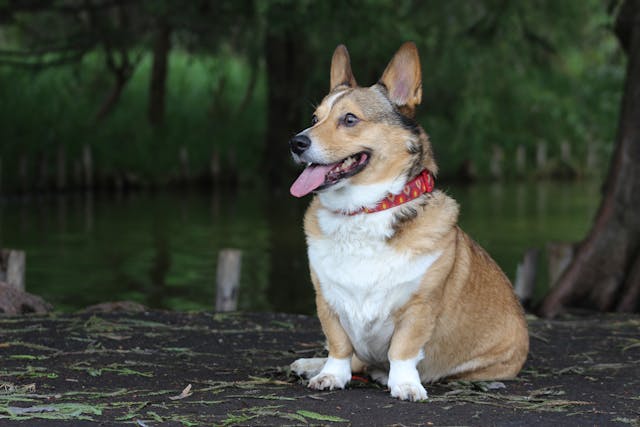Welcoming a corgi into your life is exciting! These smart and playful dogs need love, care, and attention to grow healthy and strong. At six months old, your corgi is like a teenager—full of energy and curiosity. This guide will help you take great care of your furry friend during this important time. How Much to Feed Your Corgi Puppy: Diet plan , stages more…
Table of Contents
Food and Nutrition: Build a Strong Foundation
Providing the right food and nutrition is key to your corgi’s healthy development.
- Choose Quality Puppy Food: Select high-quality puppy food with real meat as the main ingredient. Ensure it contains essential nutrients like omega-3 fatty acids for brain development and calcium for strong bones.
- Balanced Diet: Incorporate a mix of dry kibble and wet food to keep meals interesting. Avoid table scraps as they can lead to obesity and bad habits.
- Consistent Mealtimes: Feed your corgi two meals a day, spaced evenly, to maintain stable energy levels.
- Hydration: Always provide fresh, clean water to keep them hydrated.
- Monitor Weight: Regularly check their weight to ensure they are growing steadily. Consult your vet if you notice rapid weight gain or loss.

What You Should Not Do With a 6-Month-Old Corgi
Understanding what to avoid can help you prevent health and behavioral issues.
- Do Not Overfeed: Overfeeding can lead to obesity, which can cause joint problems and other health issues. Stick to recommended portion sizes.
- Avoid Repetitive Jumping: Limit high-impact activities like jumping off furniture to protect their developing joints.
- Don’t Skip Socialization: Neglecting socialization at this age can lead to fear and anxiety in new situations.
- No Harsh Training Methods: Avoid yelling, hitting, or using punishment-based training. These can harm their trust and confidence.
- Don’t Overexercise: While corgis are active, too much exercise can strain their growing bodies. Stick to age-appropriate activities.
- Avoid Toxic Foods: Never feed them chocolate, grapes, onions, or other toxic foods that could make them seriously ill.
Exercise: Let Them Burn That Energy
Corgis are active dogs and love to move around. Regular exercise helps keep them physically fit and mentally sharp.
- How Much Exercise Does a 6-Month-Old Corgi Need? They need 30–45 minutes of walking daily, combined with interactive play sessions to tire them out.
- Daily Walks: Take them on brisk walks, exploring different routes to stimulate their curiosity.
- Fun Play: Games like fetch and tug-of-war are perfect for building their agility and bonding with you.
- Mental Games: Incorporate puzzle toys or hide-and-seek games to engage their brains. Corgis thrive on mental stimulation.
- Be Careful: Protect their developing joints by avoiding repetitive jumping or running on hard surfaces.

Training and Socializing: Teach Them Early
Six months is a prime age to build your corgi’s behavior and social skills. Consistency is key.
- Basic Commands: Focus on commands like sit, stay, come, and leave it. Use positive reinforcement, such as treats and praise, to encourage success.
- Crate Training: Introduce their crate as a safe and cozy retreat where they can relax. It’s also an excellent tool for house training.
- Leash Training: Teach them to walk calmly on a leash without pulling. Start with short sessions and gradually extend them as they improve.
- Meet and Greet: Expose your corgi to new people, dogs, and environments. Positive experiences at this stage will shape their confidence and reduce fearfulness in adulthood.
- When Do Corgis Stop Biting? Biting is usually part of their teething phase and often stops by 6–8 months old. Provide chew toys and redirect biting to appropriate items to manage this behavior effectively.
Health and Grooming: Keep Them Looking and Feeling Great
Regular health care and grooming routines are essential to your corgi’s well-being.
- Vet Visits: Schedule routine checkups for vaccinations, deworming, and overall health assessments.
- Teething Help: Provide rubber chew toys or frozen carrots to soothe their gums during teething.
- Brush Their Coat: Corgis have a double coat that sheds heavily. Brush it 2–3 times a week to reduce shedding and keep their fur shiny.
- Clean Their Teeth: Brush their teeth regularly using a dog-safe toothpaste to prevent plaque and gum issues.
- Trim Nails: Keep their nails trimmed to avoid discomfort and ensure proper posture during walking.

Handle Teenage Corgi Behaviors
As they grow, your corgi may challenge boundaries. Stay calm and use consistent training to manage their adolescent quirks.
- Are Corgis Full Grown at 6 Months? Not yet! They are still developing, with most corgis reaching full size by 12–15 months. Their weight and muscle tone will continue to improve during this period.
- Chewing: Redirect their attention to durable chew toys if they start nibbling on furniture or shoes.
- Barking: Corgis are naturally vocal. Identify what triggers their barking and address it with gentle correction and redirection.
- Stubbornness: Patience is crucial. Make training sessions short and fun to keep them engaged without frustration.
Build a Strong Bond
Spending quality time with your corgi strengthens your relationship and builds trust.
- Play Together: Dedicate time daily for games, training sessions, or simply relaxing with your pup.
- Reward Good Behavior: Positive reinforcement like treats, belly rubs, and praise goes a long way in encouraging good habits.
- Learn Their Language: Pay attention to their body language and vocal cues. This helps you understand their needs and emotions better.
How Big Should My 6-Month-Old Corgi Be?
At this stage, your corgi should weigh around 15–20 pounds, depending on their diet and genetics. If you notice any signs of being underweight or overweight, consult your vet for advice on adjusting their diet and exercise.
How My Personal Experience with a Corgi Turned My Life Upside Down
Sheltie Growth Chart: When Will Your Pup Stop Growing?
Everything You Need to Know About an 8-Week-Old Corgi
The Ultimate Guide to Your 10-Week-Old Corgi

